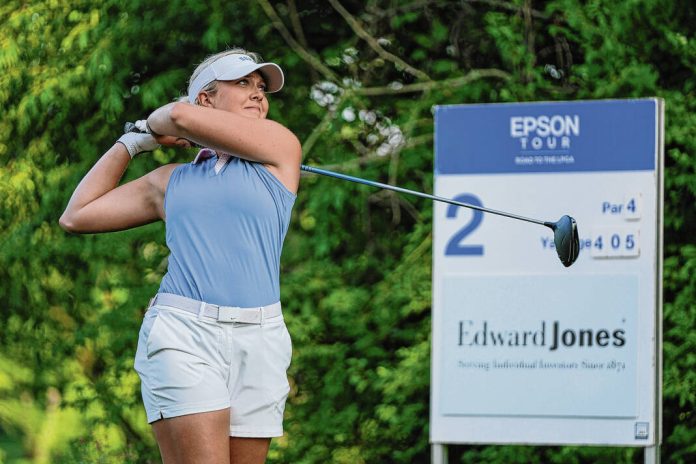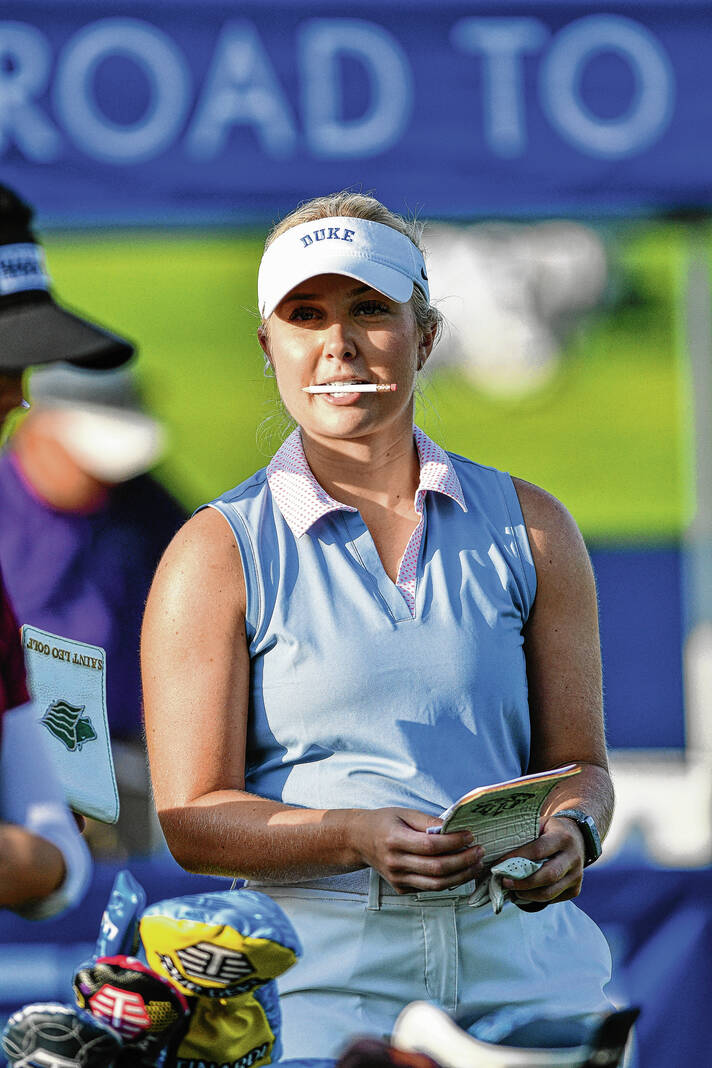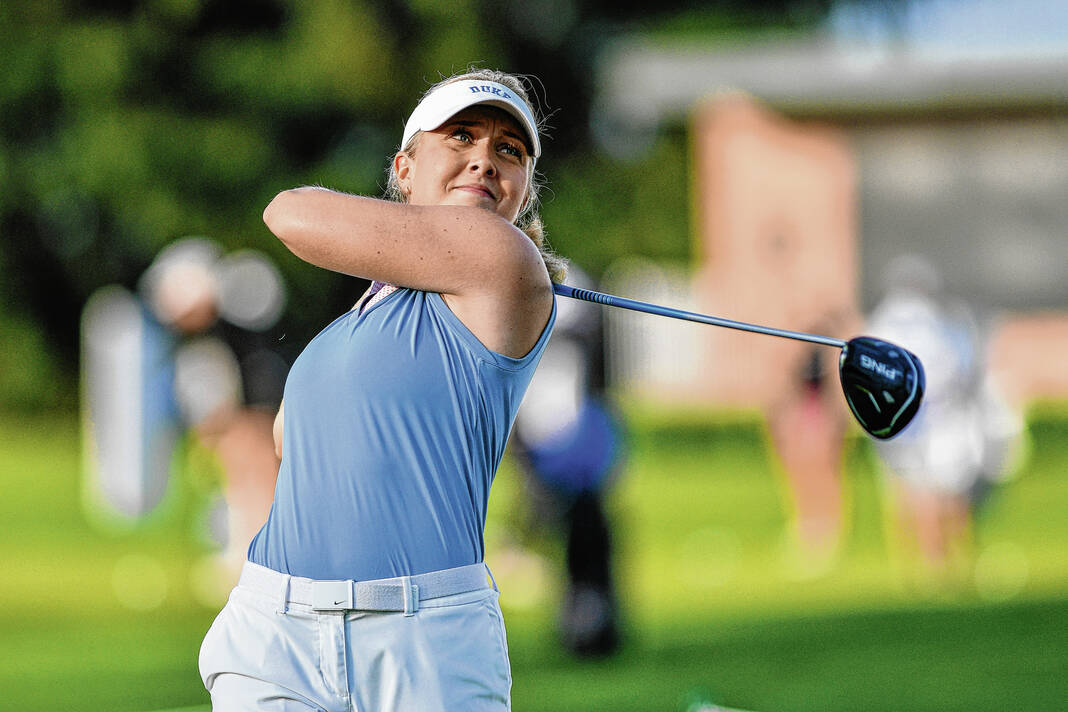Anybody familiar with Erica Shepherd’s golfing journey through high school and college might have looked at her 2024 Epson Tour results at the end of May and thought they were being pranked.
Seven tournaments. Seven missed cuts. Zero dollars.
Shepherd has gone through periodic slumps before this spring, but the timing of this one — at the start of her first professional season — certainly wasn’t ideal.
“Freshman year of college and some spans in high school, I kind of went through the same stuff, but in pro golf it’s really exposed because you have so many events to play in week after week,” the Center Grove graduate said. “So if you’re not playing well, it’s not like you can go take three weeks off and figure it out, or have a couple of months between events like you do in college or high school. …
“It kind of humbled me a little bit.”
Fortunately for Shepherd, June has brought her back to the Midwest and offered a chance for a bit of a reset. With a pair of tournaments in Michigan bookending last weekend’s Otter Creek Championship just down the road in Columbus, she has set up a temporary base back at home in Greenwood and gotten some work in on her home course, Dye’s Walk.
So far, it’s paying dividends. Shepherd made the cut at the FireKeepers Casino Hotel Championship in Battle Creek, Michigan, tying for 26th with a 74-71-72—217 to finish in the money for the first time in her pro career. She followed up by going 70-72-70—212 at Otter Creek, landing in the red at 4 under par and collecting a $3,568 prize after tying for 21st.
She’s still not at the top of the leaderboard, but it’s a step in the right direction — and having Johnson County as a home base for the time being has certainly made a difference for the 2023 Duke grad, who’s still adapting to full-throttle adulthood.
“I’d like to say that I’m all settled in in Florida and feel like I’ve got everything under control,” Shepherd said, “but it’s a lot of change to move somewhere by yourself for the first time ever. Going to Duke, I always had roommates and a bunch of friends down there, but going down to Florida was a really big adjustment for me. The golf course is 20 minutes away, and I just am used to living on a golf course. So I kind of knew in the back of my head if I can just go spend a week at home and do my stuff on the course at Dye’s Walk, I know that I can somehow figure this out.”
The biggest problem during the early part of the season, Shepherd said, was her accuracy. During those seven tournaments where she didn’t make it to the final day, she was only hitting about nine or 10 greens in regulation per round. At Otter Creek, she hit 43 of 54 on the weekend, her best such performance this season.
Even after that effort, she ranks 63rd on the tour in greens in regulation and 123rd in driving accuracy.
“My short game has been what’s been keeping my scores manageable, not too far off,” Shepherd said. “But the first seven events, I was hitting the ball really bad. My whole life, I’ve always been a really good ball striker, and I’ve always known my misses, known where the ball was going to go, and I was just really not hitting it well.”
Part of the problem is that in the past, Shepherd always had a coach close by to monitor her swing and make sure nothing ever veered too far off course; there was constant feedback. This year, she hasn’t had that luxury.
There also haven’t been many opportunities to step back and assess the situation in real time. Shepherd played three straight weekend tournaments in March, and then had a four-week hiatus before playing four consecutive tourneys in California, Arizona and Utah. At the end of that stretch, she had two weeks off to prepare for the current run of four June events in as many weekends.
In golf, as in real life, Shepherd is now largely going it alone.
“There’s definitely a learning curve,” she said. “In college, you’re traveling with your teammates and you have coaches out there every day checking your alignment, kind of making sure your swing’s at least in check, and then out here you’re completely on your own. You get to see your coach when you’re home or when you travel to go see him, but other than that it’s all you. I’ve made some friends out here on tour, so it’s really not that lonely, but the golf part, you’re responsible for absolutely every single part of it.”
Fortunately for Shepherd, she knows her own game pretty well at this point, so she knows what to look for. She utilizes video analysis and the guidance she’s received in the past to check herself, and she’s made some recent tweaks to get back to a more familiar place.
The payoff hasn’t been massive just yet, figuratively or literally, but Shepherd is confident that she’s trending up.
“I just feel like my swing is in a much better spot now and I’m finally hitting the ball well again,” she said.
Still, there’s work to be done. Golf is no longer just a sport for Shepherd — it’s a job, and her performance dictates whether or not she’ll get paid week to week. She’s always played to win, but now she’s playing to eat, too. Mentally, that hasn’t been a huge adjustment; Shepherd says she’s always put a lot of pressure on herself to do well.
And she almost always has done well. Shepherd was a highly decorated amateur player, a winner of two USGA championships and a two-time collegiate All-American, and she had impressed in most of her previous professional tournaments — so being relieved just to make a cut, rather than contending, was an unfamiliar feeling.
“It felt good,” Shepherd said of ending her seven-cut slump. “It didn’t feel like anything out of body; it just felt like I was back to Erica golf. But it was weird; I missed seven cuts in a row, and I think up to that point I had only missed two or three cuts in professional events that I’d played in as an amateur, so that stuff felt really weird. Just only playing two-day events and missing out on the weekend. I absolutely hated that, so yeah, it felt good to finally make a cut. But it’s kind of funny that that’s what felt good for me, because usually I don’t care about the cut — I’m trying to win.”
The wins will likely come again at some point for Shepherd. Having faced adversity right out of the gate as a professional, she’s getting her groove back while also finding that even the coldest of cold spells can’t snuff out her passion for the game.
“I still absolutely love it,” Shepherd said. “Even though it’s technically my job now, I still love it just as much and care just as much as I possibly can.”
Rare is the person who gets to make a living doing something that he or she loves. Shepherd might still be learning a lot of things on the fly in young adulthood, but even with all of her rookie struggles, she’s already made perhaps the most important cut of her life.













